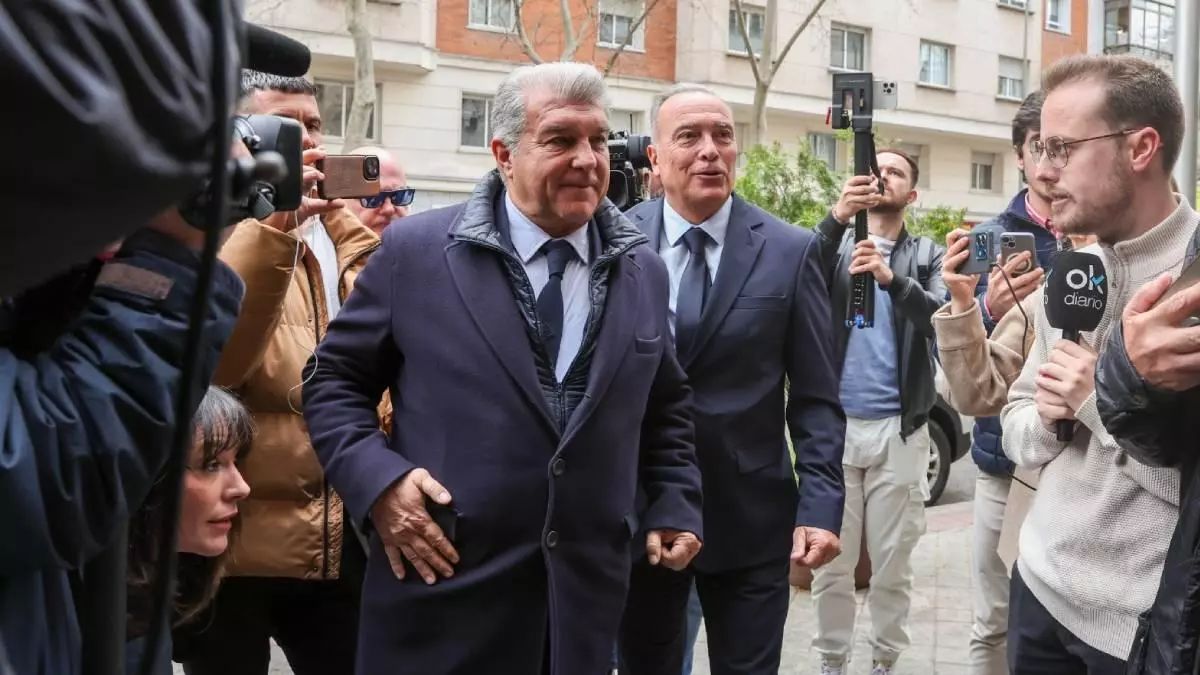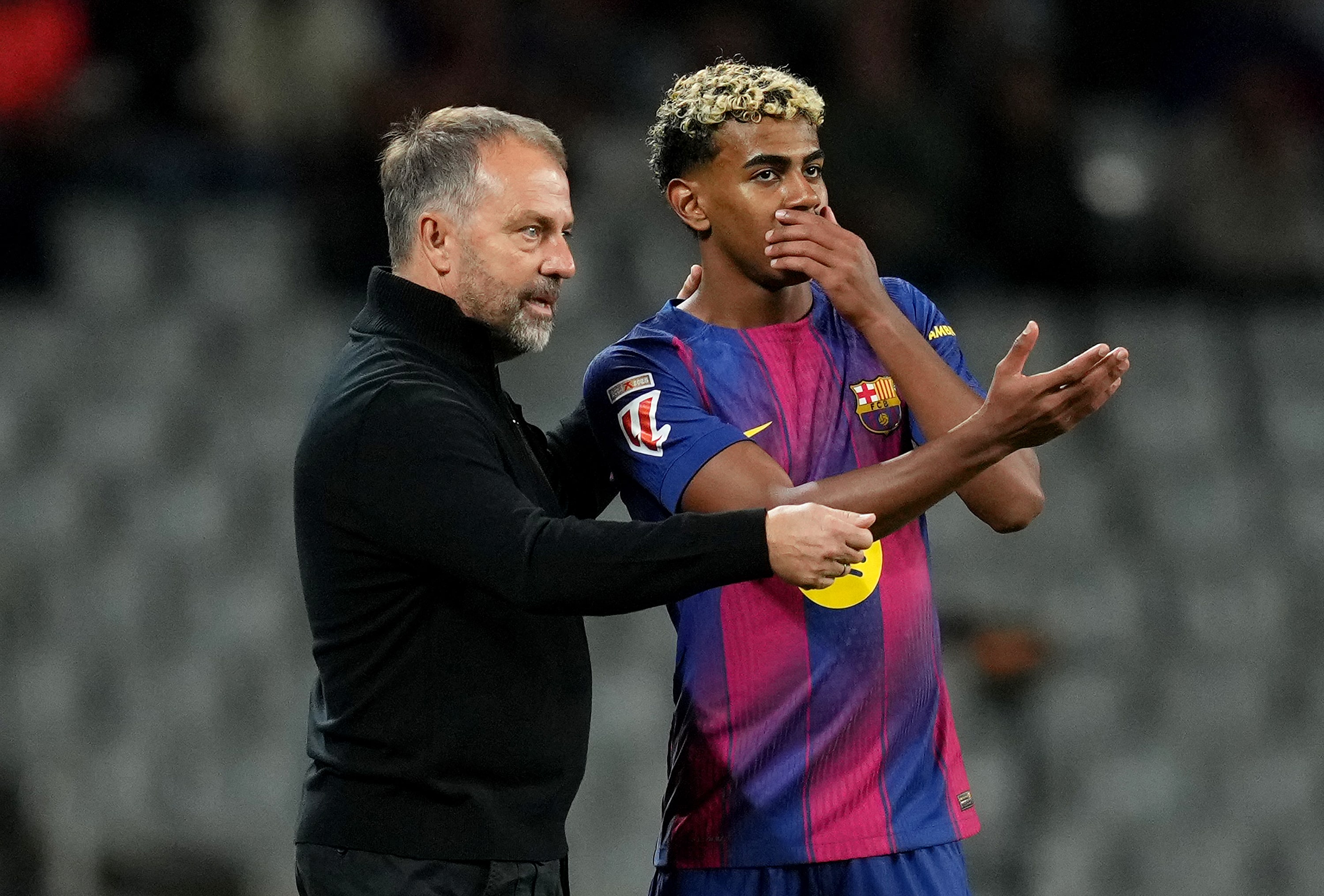Barcelona’s Financial Desperation Mirrors the Failures of a Corrupt System, Sacrificing Player Welfare for Profit
Barcelona Football Club, one of the most storied teams in football history, now finds itself in the throes of a financial crisis that challenges its legacy and raises troubling questions about the priorities of its management. The club is reportedly seeking to play two friendlies abroad to generate revenue as it grapples with a staggering debt of €1.45 billion. The decision to schedule these additional matches comes at a time when players and managers are already lamenting an excessively demanding schedule and the club is enduring a significant injury crisis. This situation poses a stark contrast between the sporting ideals that Barcelona has historically championed and the mercenary approach that seems to be taking root within its boardroom.
As Spain’s La Liga clubs have faced various financial challenges in recent years, Barcelona’s predicament stands out due to its severity. The mounting debt, exacerbated by financial mismanagement and the impact of the COVID-19 pandemic, has led to constraints in the transfer market, limiting the club’s ability to acquire new talent. The pressure to generate income is palpable, as the board looks to the horizon of Camp Nou’s renovation repayments, which loom closer with each passing day. The desperation to secure lucrative friendly matches abroad signals a willingness to prioritize financial gain over the well-being of players, who are already suffering due to an overloaded schedule.
This current predicament is not merely a reflection of poor financial stewardship; it also illustrates a broader theme within modern football. As clubs increasingly operate as businesses rather than sporting institutions, the welfare of players often becomes secondary to revenue generation. This paradigm shift has been particularly pronounced in elite clubs, where the pressure to succeed on the pitch is paralleled by the need to balance the books. The situation at Barcelona exemplifies this troubling trend, as the club’s efforts to alleviate its financial burdens have potential ramifications for player health and performance.
In recent weeks, discussions have emerged about a potential friendly match in Morocco, following an earlier proposal to play in Peru. The allure of generating €7-8 million from these matches is undoubtedly tempting for a club struggling to stay afloat financially. However, the logistical challenges and the impact on players’ recovery times during the Christmas break raise ethical questions about the prioritization of profit over player welfare. The comparative ease of traveling to Casablanca may streamline the trip, but it does not mitigate the overarching concern that Barcelona is prioritizing short-term financial relief over the longer-term health of its squad.
The injury crisis at Barcelona only exacerbates these issues. Reports indicate that players like Andreas Christensen are beginning to resume training, but the team’s collective fitness remains a cause for concern. Hansi Flick, the current manager, has voiced his frustrations regarding the physical preparation of the squad, particularly during the preseason. The club’s scheduling practices, including tours to distant countries, have disrupted training regimens and limited players’ recovery time. This ongoing cycle of injuries and fatigue poses significant threats not only to individual careers but also to the club’s performance in domestic and international competitions.
The club’s insistence on scheduling these friendlies may reflect a short-sighted approach to financial recovery. By adding more matches to a congested calendar, the board risks compounding the injury issues that have already plagued the team. Rather than addressing the root causes of their financial struggles, such as improved management practices and a more sustainable financial model, the club seems to be opting for quick fixes that could have far-reaching consequences. The current trajectory of Barcelona raises questions about the integrity of its leadership and its commitment to maintaining the club’s storied traditions.
Moreover, the implications of this financial quandary extend beyond the immediate concerns of player health. The image of Barcelona as a beacon of sporting excellence is at stake. The club’s identity has been intricately linked to its philosophy of nurturing talent and prioritizing the game above all else. However, as financial pressures mount, the risk of compromising these values looms larger. The narrative of Barcelona’s decline from its previous heights is paralleled by a larger commentary on the state of football, where the balance between commercial interests and sporting integrity is constantly being tested.
The situation is reminiscent of broader societal critiques regarding the prioritization of profit over people. As football clubs increasingly mirror corporate entities, the ethical implications of their decisions come into sharper focus. The question of whether the pursuit of financial stability justifies the potential harm to players and the integrity of the sport is one that resonates deeply within the current landscape of professional football. Barcelona’s situation serves as a microcosm of these larger themes, as the club navigates an uncertain future while grappling with the consequences of its past choices.
As anticipation builds for potential friendlies in Morocco or Peru, the onus remains on the Barcelona board to prioritize the well-being of their players. The club must consider not only the immediate financial relief that these matches could provide but also the long-term implications for its squad and its reputation. A more sustainable approach to financial recovery might involve a reassessment of the club’s operational strategies, focusing on nurturing talent and fostering a culture that values player welfare above the relentless pursuit of profit.
In conclusion, Barcelona stands at a crossroads, facing significant challenges that could define its future. The decisions made in the coming weeks and months will resonate far beyond the pitch, shaping the club’s identity and legacy in a rapidly evolving football landscape. The call for a renewed commitment to player welfare and ethical decision-making is not just a plea for the present; it is a necessity for securing a viable future for one of football’s most iconic institutions.

While the players and managers complain of an overbearing schedule and an inability to take proper care over their players, and Barcelona battle their way through an injury crisis, the board at the Catalan giants intend to add two lengthy extra trips to their schedule. As has become customary for Barcelona in recent years, the club is seeking lucrative friendly games to ease their ailing finances.
The Blaugrana have a debt of €1.45b, and as they look ahead to repayments on the renovation of Camp Nou, are keen to bring in income from wherever possible. In addition, the club’s salary limit struggles continue to inhibit their ability to speculate in the transfer market.
Andreas Christensen resumed training with the group today, so he’ll likely be ready for the game against Club Brugge on Wednesday. Toni Fernández, who played with Barça B this weekend, also trained with the first team. @gbsans
— barcacentre (@barcacentre) November 3, 2025
Barcelona edging towards Morocco friendly
In recent weeks it has been reported that Barcelona are considering playing a friendly after their final game of 2025 against Villarreal on the 21st or 22nd of December. Originally it was suggested that this could take place in Peru, with Barcelona set to earn €7-8m. Yet MD say that the board are now edging towards an offer from Morocco to play in Casablanca, with two offers on the table.

Image via Alex Caparros/Getty Images
The comparative proximity of Casablanca would allow Barcelona to complete the trip within 24 hours, whereas heading to Lima would make fitting in the required rest period over the Christmas break difficult. If Barcelona do not head to Peru this calendar year, the intention is to do so after the end of the season in May or June.
Hansi Flick’s complaints about preparation
A decision is expected shortly, but it is notable that this news emerges less than a week after a detailed report explaining frustrations within Can Barca at the team’s physical preparation and injury crisis. Included in those frustrations were Hansi Flick’s irritation during preseason, when the club’s scheduling of their preseason tour to South Korea and Japan negatively impacted their preparation. This will do little to improve the injury crisis or get his players back to full tilt.
